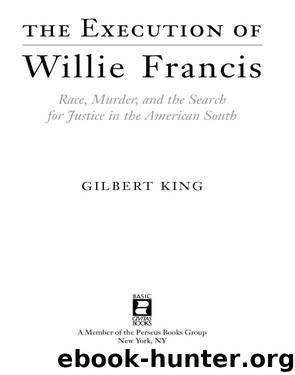The Execution of Willie Francis by Gilbert King

Author:Gilbert King
Language: eng
Format: epub
Publisher: Basic Civitas Books
get to the law
I told Justice Black . . . that I would not stand for any more of his bullying . . .
—JUSTICE ROBERT JACKSON
On April 22, 1946, just two weeks before Willie Francis had been strapped into Louisiana’s portable electric chair in a failed attempt to take his life, the U.S. Supreme Court was nearing the end of its first postwar term—a term marked by jealousy, public backbiting, and dysfunction. It was about to get worse. Chief Justice Harlan Fiske Stone, who had just finished voicing his philosophy in regard to judicial restraint, was about to deliver his opinion on a case, when the Court fell silent. Justice Hugo Black sensed something was wrong and gaveled an adjournment. Stone sat slumped, unconscious, on the bench. Black and Justice Stanley Reed helped remove the chief justice from the bench, and he was rushed to the hospital. Stone had suffered a massive cerebral hemorrhage. He died later that afternoon.
Now leaderless, the judiciary that President Roosevelt had filled with his own appointments had for years been mired in philosophical feuds that were eroding public confidence in the nation’s highest court. Prior to Stone’s death, with Justice Robert Jackson absent because he was serving as the American prosecutor at the Nuremberg War Crimes Trial, the severely divided Court had been besieged by 4-4 decisions and an endless flow of dissenting opinions. Tension among the Supreme Court justices, which had been building for some time, finally reached toxic levels during Jewell Ridge Coal Corp. v Local Number 6167, the case known simply as Jewell Ridge to legal practitioners that came before the court in 1945.
When Justice Black declined to recuse himself from considering the case—although Black’s own former law partner was representing one of the parties to the lawsuit, Local Number 6167 of the United Mine Workers—he prompted the fury of Justice Jackson. To further enflame his peers, Black ended up, or so it appeared, providing the crucial swing vote that brought the Court to rule in his ex-partner’s favor.
Justice Stone had suggested at a conference of all the justices that the Court issue an opinion saying that it had no authority to force Black to recuse himself; that it was up to Black himself. Black had approached Jackson in private. If this opinion was issued, he’d said, “it would mean a ‘declaration of war.’” Shortly thereafter, Justice Robert Jackson, appalled by what he considered shameless judicial behavior, told Black that he “would not stand for any more of his bullying.”
The opinion proved to be as divisive as Black had foretold—a virtual declaration of war. It marked the beginning of a feud that would shake the Court’s foundations for years. It would also erupt into the public arena, eventually ruining one man’s chance to become chief justice. While subsequent developments would create the impression that it was Black and Jackson who stood most strongly at odds, the battle for the soul of the Court was, in truth, a battle between Justice Felix Frankfurter,
Download
This site does not store any files on its server. We only index and link to content provided by other sites. Please contact the content providers to delete copyright contents if any and email us, we'll remove relevant links or contents immediately.
| Africa | Americas |
| Arctic & Antarctica | Asia |
| Australia & Oceania | Europe |
| Middle East | Russia |
| United States | World |
| Ancient Civilizations | Military |
| Historical Study & Educational Resources |
Cat's cradle by Kurt Vonnegut(15324)
Pimp by Iceberg Slim(14476)
4 3 2 1: A Novel by Paul Auster(12363)
Underground: A Human History of the Worlds Beneath Our Feet by Will Hunt(12081)
The Radium Girls by Kate Moore(12012)
Wiseguy by Nicholas Pileggi(5765)
The Fire Next Time by James Baldwin(5422)
Perfect Rhythm by Jae(5394)
American History Stories, Volume III (Yesterday's Classics) by Pratt Mara L(5293)
Paper Towns by Green John(5174)
Pale Blue Dot by Carl Sagan(4993)
A Higher Loyalty: Truth, Lies, and Leadership by James Comey(4946)
The Mayflower and the Pilgrims' New World by Nathaniel Philbrick(4484)
The Doomsday Machine by Daniel Ellsberg(4481)
Killers of the Flower Moon: The Osage Murders and the Birth of the FBI by David Grann(4433)
The Sympathizer by Viet Thanh Nguyen(4382)
Too Much and Not the Mood by Durga Chew-Bose(4333)
The Borden Murders by Sarah Miller(4303)
Sticky Fingers by Joe Hagan(4185)
